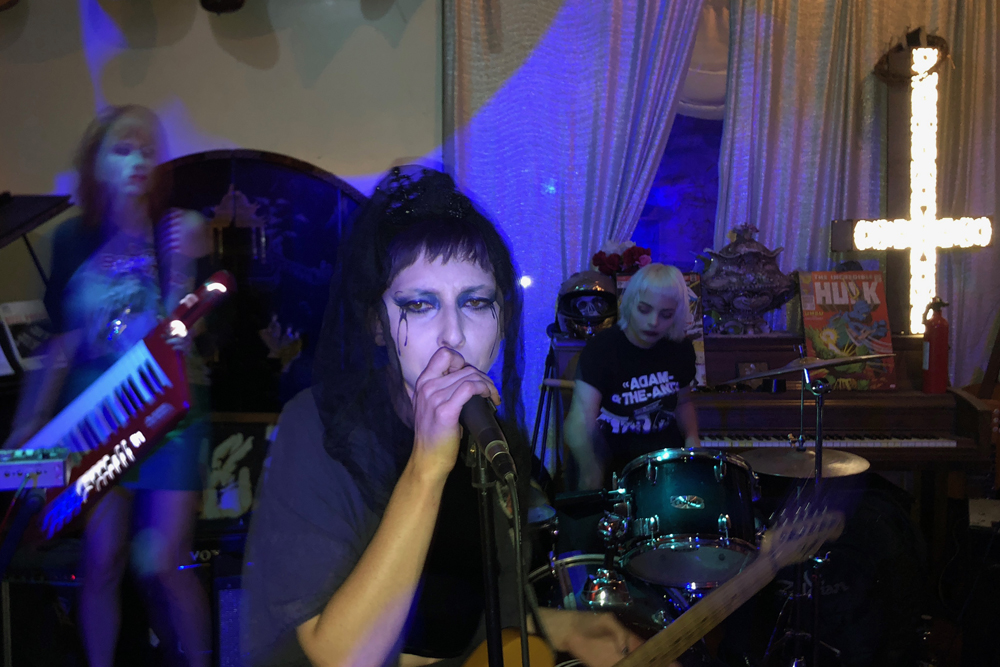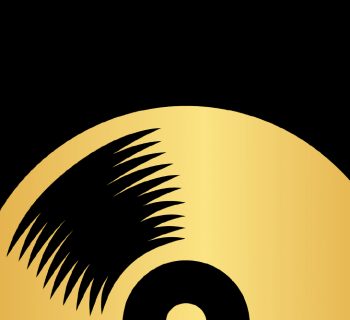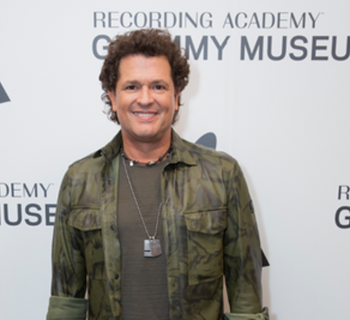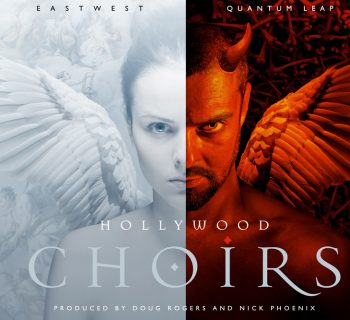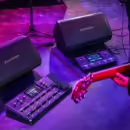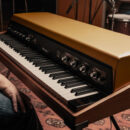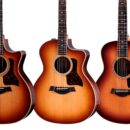Although still in their late teens and early twenties, brothers Jake Kiszka (guitar); Josh Kiszka (lead vocals); Sam Kiszka (bass and keyboards) and longtime friend Danny Wagner (drums) have become the seasoned torchbearers of a new era of melodic and creative hard rock. Hailing from the small town of Frankenmuth, MI, Greta Van Fleet has been earnestly making a mark on the global cultural scene since early 2017. In that time they have performed sold-out concerts in North America and Europe, received accolades from diverse entertainment legends such as Elton John and Tom Hanks, amassed millions of YouTube and Spotify plays, released two #1 charting EPs (Black Smoke Rising and From the Fires) and have at long last dropped their debut full-length album Anthem of the Peaceful Army.
For this Q&A, Music Connection sits down with Sam and Jake Kiszka to discuss their amazing career trajectory, their new album, and all that keeps the Greta Van Fleet machinery in motion.
Music Connection: What is the significance of the title of your new album Anthem of the Peaceful Army?
Sam Kiszka: I think the peaceful army is anyone. It’s a conscious decision at the forefront for people who speak freedom and can see past people’s political views. I think right now is a time in history where we need this more than ever.
MC: What can you tell me specifically about the new album itself?
Jake Kiszka: I think we’ve come a long way since our last EP, From the Fires, about a year and a half ago. All our consistent traveling and touring has informed the album artistically and musically. I think our objective was to create something beyond what we did on our first two EPs. Another ambition of ours was to create dimension throughout the album as well.
We can do something very acoustic and intimate and then follow that with something very aggressive and electrified. Some of it was premeditated and some of it was just as the recording process happened.
Sam: I think we really stretch out on Anthem of the Peaceful Army. We kind of touch on all the ends of the musical spectrum that we’re capable of. We wanted to keep it as simple and live sounding as we could in the studio. It’s a bit of a statement, I suppose, in this modern musical climate. People sit down and get out their calculators and say, “Well, I think this one is gonna be a hit!” We’re tired of that and I think everybody’s tired of that. It’s a movement, and I think a lot of our contemporaries are on this trail as well. There are people today that are releasing very authentic music that touches the soul. It’s an exciting time for music right now. It’s a cultural explosion!
MC: And you had a strong production team behind you on the new record, as well.
Jake: Yeah, we’re working with two highly skilled translators, Al Sutton and Marlon Young. We’ve worked with them for, like, three years now. They’ve mentored us into being better musicians in the studio. Herschel Boone has also worked in production on this new record.
MC: You guys started doing gigs when you were 13 and 14 years old. Tell me about the level of commitment beginning so young?
Jake: We’ve been pretty dedicated to our craft from the start. A lot of our early sacrifices were not being able to hang out with our friends on weekends because we’d be playing at a bar somewhere. In that sense you kind of grow up faster than most, I’m assuming. But if it’s something you’re passionate about, then it’s something you would be doing anyways. We saw things most 13- and 14-year-olds wouldn’t normally see. We used to play a lot of biker shows throughout Michigan at these backwoods camps. We’d do, like, a three-hour set, playing until midnight, while they’re shooting guns in the air and doing drugs and stuff. We saw somebody pull a knife on someone at a bar one night.
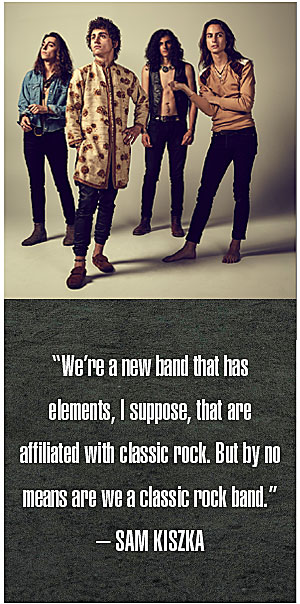 MC: Being that you were so young I’m assuming your parents were pretty hands-on with the gigs and traveling?
MC: Being that you were so young I’m assuming your parents were pretty hands-on with the gigs and traveling?
Jake: Absolutely, for the most part. We had a manager, Michael Barbee, who was working with us then, too. He was pretty protective of us, from some of the bad stuff that could go down at some of these gigs. We were mainly doing shows to get gas money so we could get to the next gig and where we needed to be.
Sam: There have been a few trials and tribulations along the way. But this has been the most fun and crazy life I think I could ever live. I look back and think we worked very, very hard but it didn’t seem like it.
MC: Well, it certainly seems like you guys had a very old-school attitude in terms of hard work and perseverance.
Sam: Yes, but we didn’t realize that touring could be so easy. When things started getting more serious we upgraded to a van. That thing was a rolling deathtrap! Luckily, we were only in there for three or four months. We quickly upgraded to a bus in the fall of last year. Life now is very easy. It’s more complex, but easier.
MC: Along those lines, let’s talk about where you are at now. Describe a typical day on tour?
Jake: The only thing that’s really ever consistent on the road is the time we’re scheduled to show up for soundcheck prior to a show that day. You never know what’s gonna happen. We’ve had buses break down in the middle of nowhere. We were on our way to a festival that was three or four hours north of Los Angeles. We broke down about an hour outside of LA. We spent the night on the bus and then decided to rent an SUV and drove nearly five hours because we didn’t wanna cancel the show. We made it 20 minutes before we were set to go on stage. So, we never know what will befall us on any given day. It’s very interesting.
MC: On average how do you prepare for a show before and after?
Sam: You learn what you want to do before a show. How can you get into the zone? What after-show food is your fancy? All these things, like how do you pack your suitcase and stage wardrobe cases? But life has gotten so easy. It’s an amazing thing and we’re having a shitload of fun!
MC: Well, that’s good! But can you expand on what you’ve learned about show prep?
Sam: I think the most difficult thing is what you do before a show. It can put you in the right spot or put you in the absolute wrong spot to go onstage. It’s a very different experience and I don’t think it’s an innately human thing to go onstage and be watched by thousands of people. So putting yourself in the right mindset to do so is very, very important. We try to engage musically without thinking about what we’re about to do. We’ll take a little time to warm up on our instrument, have a couple consumables, perhaps, and, ultimately, us four playing acoustically together.
MC: Do you have much time to write and be creative on the road?
Jake: Yeah. A lot of people say it’s difficult to write on the road, but we have our acoustic guitars on the bus with us so we’re constantly playing.
MC: How does being, essentially, a family band work between you and your siblings?
Sam: Well, especially in the beginning, we had a lot of disagreements. I think that’s part of being a family and being artists. We were practicing in the garage and we’d get pretty violent with each other. We took the music very seriously and wanted everything to be perfect. But things are much more civil now. We’ve found ways to compromise and try to understand where each other is coming from musically. Of course, myself, Josh and Jake knew each other since birth and Danny I’ve known since first grade. We’ve always been together. I think it adds something three-dimensional to the music. We’ve been playing together so long and have grown pretty much from nothing. I think it adds an extra depth of communication within our instruments.
MC: What is the biggest misconception the public has about Greta Van Fleet?
Sam: That we’re a classic rock band. Not only is that not correct, it’s fundamentally false. In order to be a classic rock band you have to have a sustained career. We’re a new band that has elements, I suppose, that are affiliated with classic rock. But by no means are we a classic rock band. If the music sustains for, what I hope, would be 50 years, then it would be classic. But right now we play rock and roll that is present, modern and addresses a lot of things that are going on today.
MC: I’m sure there have been many, but what are some of the highlights Greta Van Fleet has experienced so far?
Jake: Playing with Elton John at his Oscars party certainly was a highlight! There was a show we did in Quebec City with the Foo Fighters. There were probably 50,000 people at this thing. And you could look really far back and it was just a sea of people. While we were playing, there was this downpour of rain that was hitting the roof of the stage, combined with this mist that was rising like smoke. And the crowd got so loud that it roared above the volume of the music. It was just an incredible feeling.
MC: What are some of your daily challenges?
Jake: There are not too many challenges. We’ve been fortunate to pick the management we wanna be with and the people that work with us. As I may have referenced before, maybe just traveling from one place to another can be a challenge at times.
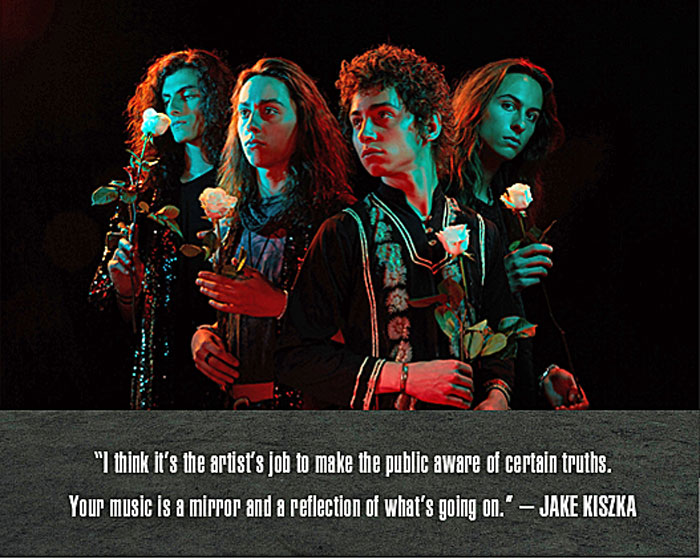
MC: Does your band have input in regards to choosing opening acts or shared bills?
Sam: Yes, it’s nice to have rock & roll bands open for us. It kind of gives the audience a double take of rock & roll spirit. For example, having Dorothy out with us is almost nostalgic for some people and gives the younger people something relatively new and special. We also like to throw things in that you wouldn’t really expect, like working with Cloves. You can’t really put a label on it. It’s an attitude. And, in my opinion, that’s rock & roll. Because I think rock & roll exists as an attitude and not a musical style. We like to broaden the spectrum and give the audience a wider perspective on the modern musical climate.
MC: You are signed to Lava Records. What has your relationship been like with them?
Sam: It’s been everything we expected and more than we could ever ask for. There are very few bands today that have the freedom musically and artistically that we have. The reason we really love Jason Flom (Lava Records CEO) is because he is a rock & roll spirit and we really relate with him. Not only with his humanitarian movements and mindset, but he really is hands-off in the studio. I think this is so important. A lot of times labels function as anti-music. They dumb everything down and pollute music. Jason and Lava nurture what we do.
MC: I know you’ve heard this reference quite a bit, but what about the comparisons the press and public have made about GVF sounding so similar to Led Zeppelin? How do you respond to that?
Sam: I think in the last year, especially with our new tracks coming out, that comparison has kinda grown old with people. It’s been a really high compliment being compared to Led Zeppelin. They are one of the greatest bands of all time. I could understand why people were saying that when the only song they were hearing was “Highway Tune.” I think the whole Led Zeppelin thing started to be negated when we released our second EP, From the Fires. That featured two covers, “Meet on the Ledge” by Fairport Convention and Sam Cooke’s “A Change is Gonna Come.” I think we wanted to show our grass roots and where we musically came from. I think people take us more seriously now, which is a real blessing.
MC: What is your process for selecting songs that make it on a record?
Sam: The process is called chaos (laughs)! It’s called everybody speak your mind at once and speak freely without holding anything back. As an artist, when you’re making material there’s absolutely nothing organized about it. Your brain goes in different directions, and in the end it makes sense. But at the moment, it’s very difficult to hold onto all these things that you’re trying to incorporate and put into a performance.
And when we got into the studio we thought we were gonna use all the songs we recorded or wrote in the past five years. We got in the studio and started playing them and they were too simple. We were kind of disappointed, and I think a lot of songs were spawned in that instant. This was back in February and we wrote and recorded them in the same couple of days. We took parts of old songs and made them into what Greta Van Fleet is right now.
MC: Finally, Jake, you had mentioned in a previous conversation about Greta Van Fleet having a strong message of peace, love and unity behind the band’s music and persona. How does this message go along with the current climate in the US and abroad?
Jake: I think the construct of those three elements personified in the music are ones that have always been important in how we treat one another. And we certainly are not the only artists who share these beliefs. The people that interact at our shows and like our music seem to treat each other with kindness and respect. And that’s very important to us. I think it’s the artist’s job to make the public aware of certain truths. Your music is a mirror and a reflection of what’s going on. And a lot of stuff that’s going on currently in society is influential on our music. And there are a lot of these ideas on the new album as well.
Contact Heidi Ellen Robinson-Fitzgerald at herfitzpr.net


